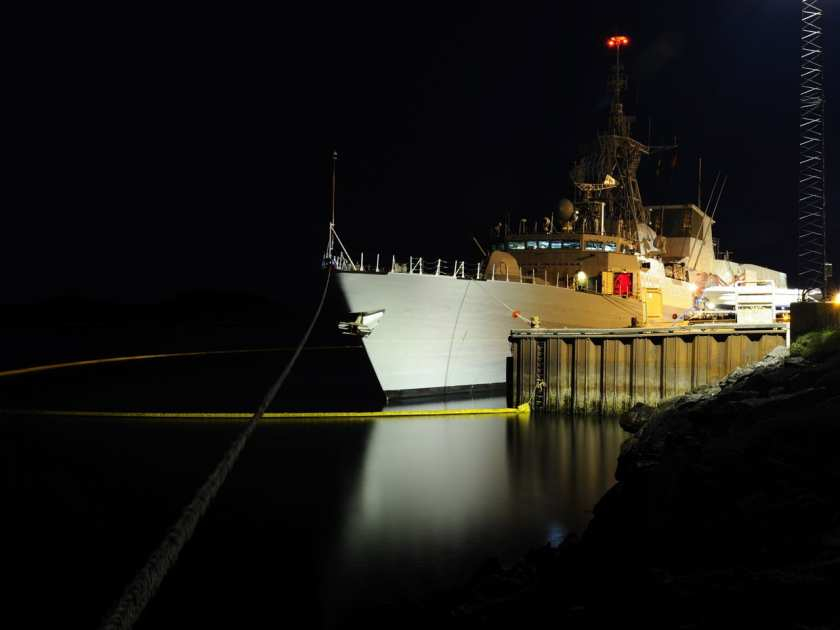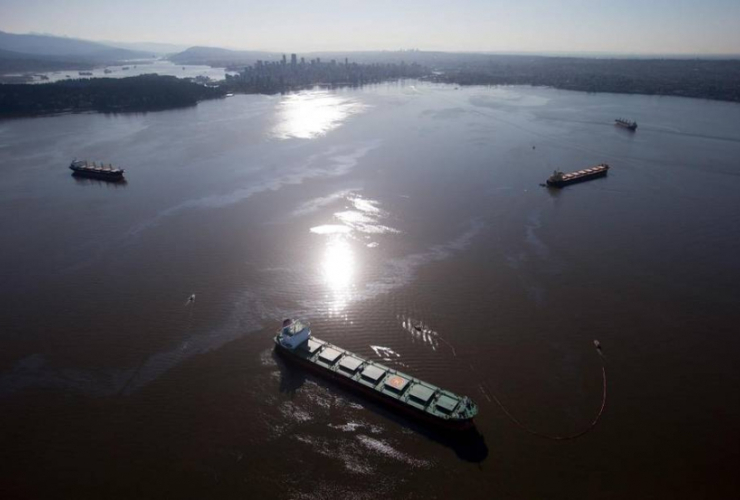The Department of National Defence (DND) will shell out $100,000 in fines after admitting its naval warship, the HMCS St. John's, accidentally spilled about 9,000 litres of diesel fuel into the Halifax Harbour in 2013.
The department said it has learned from the incident on May 8 three years ago, when the vessel's storage tanks overflowed with fuel during a transfer, leaking the excess diesel into the ocean. Environment and Climate Change Canada laid charges against DND in January last year for violating the federal Fisheries Act, an offence to which DND pled guilty:
"DND accepts full responsibility and will pay the $100,000 fine," said Lt. Len Hickey, a public affairs officer for Maritime Forces Atlantic (MARLANT), in response to the April 11 sentence by the Halifax Provincial Court. "It is justified, and generally speaking as a learning institution, we’re constantly adapting and improving our procedures."
The 134-metre ship was anchored near Dartmouth Cove directly across from downtown Halifax when the oil spill took place, and according to local media, about a dozen boats and 150 people helped boom the fuel and clean up the harbour. The Environment and Climate Change Canada said on Wednesday that $98,000 of the $100,000 will be directed to its Environmental Damages Fund, which uses money from fines as part of a fund for projects that benefit the environment.
Gretchen Fitzgerald, director for the Atlantic chapter of Sierra Club Canada Foundation, was pleased the Royal Canadian Navy (RCN) will be making amends for the infraction, but said it still has a long way to go in cleaning up its environmental performance.
A record of oil spills
"We have to start treating the Halifax Harbour more like an ecosystem," she explained. "The navy should have a target of zero spills if they don’t already... and I think there needs to be a stronger mechanism and policy of prevention."
The Department of National Defence was previously penalized for a spill on March 16, 2011, when an estimated 14,000 litres of marine diesel fuel was discharged from HMCS Preserver, and an investigation is currently underway for a small overflow fuel spill of 800 litres from the HMCS Athabaskan earlier this year. Both incidents took place in the Halifax Harbour, a bustling trade, tourism, and fishing port.
In the case of the HMCS St. John's, the fine works out to roughly $11 per litre spilled, Fitzgerald added, but in the interest of further protecting Canada's ecosystems in the future, she suggested that the cash penalty should be commensurate with the damage done.
"We don’t really know the comprehensive ecosystem impacts [of an oil spill]," she explained. "Was there an estimate on the damage? There’s a lot of discussion of going into the Arctic with our naval fleet and the Gulf of Saint Lawrence, which is covered in ice — cleaning up an oil spill in ice is pretty much mission impossible right now, so I’m not sure a simple fine system is going to work in that case."
Learning from past mistakes
The Department of National Defence however, has said it has learned from the mistakes of previous oil spills. During the May 2013 incident, it took about four hours for military personnel to realize oil was spilling into the ocean, said Hickey, but the military has disciplined the "inattentive" officers responsible.
An investigation later resulted in 13 different recommendations to improve procedures and protocols for the navy fleet, which RCN is working on putting into practice, he added.
“Of the 13, nine of the recommendations have already been implemented, and currently a response is required from the technical authority prior to implementing the remaining four," he told National Observer.
Though Hickey was unable to provide specific details on what the Royal Canadian Navy (RCN) has changed since the incident, he said improvements have focused on fueling its vessels, and transferring fuel at anchor. The deadline for paying the $100,000 fine is April 29, 2016.





Comments